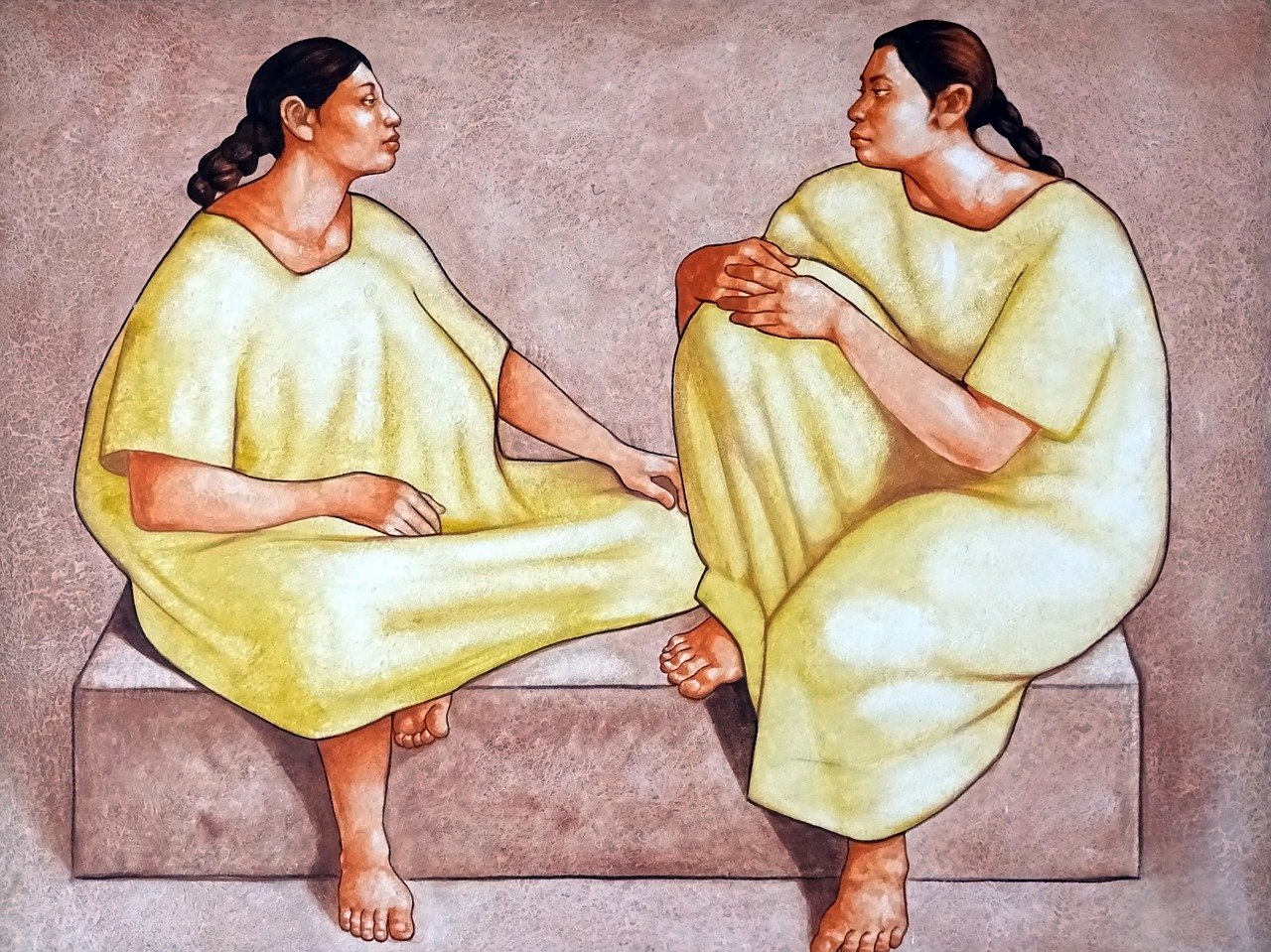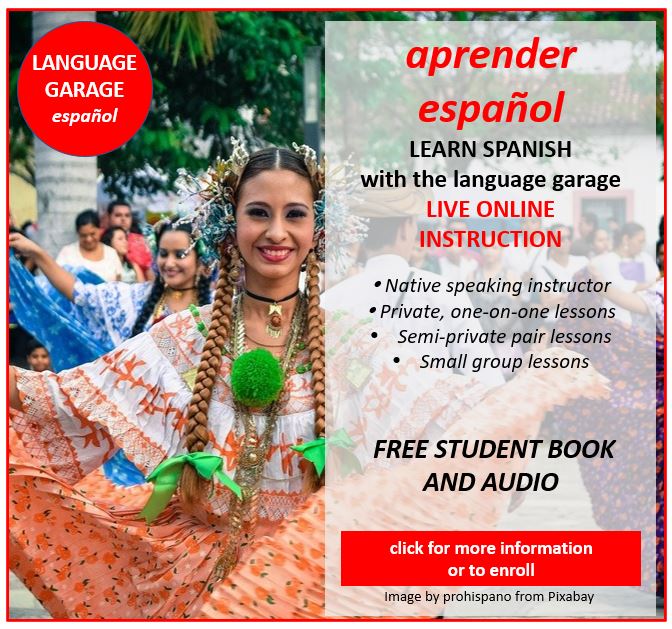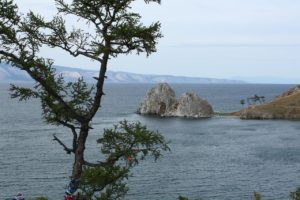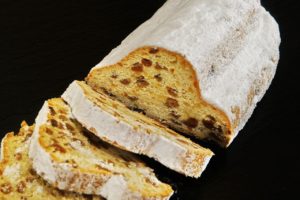In this post we’ll learn basic Spanish vocabulary related to the human body.
La cara: The Face
Let’s start at the top, with words related to the head and face: la cabeza head, la cara face, el ojo/ los ojos eye/ eyes, la ceja/ las cejas eye brow/ eye brows, las pestañas eye lashes, la nariz nose, la boca mouth, el diente/ los dientes tooth/ teeth, el labio/ los labios lip/ lips, la oreja/ las orejas ear/ ears, la mejilla/ las mejillas cheek/ cheeks, la frente forehead, la barbilla chin, el cuello neck, el cabello, el pelo hair, el bigote mustache, la barba beard.
- Tengo los ojos marrones/ azules/ verdes.
I have brown/blue/green eyes. - No comas con la boca abierta.
Don’t eat with your mouth open! - Me estoy cepillando los dientes.
I’m brushing my teeth.
- Él tiene las orejas grandes.
He has big ears. - Ella tiene la nariz pequeña.
She has a small nose. - No tengo (llevo) barba, pero tengo (llevo) bigote.
I don’t have a beard, but I have a mustache. - Ella tiene el pelo muy largo.
She has very long hair. - Me duele el cuello.
My neck hurts.
GRAMMAR TIP! Notice that Spanish doesn’t typically use possessives with body parts. In English, we say my neck nurts or don’t eat with your mouth open, but in Spanish we use the definite article instead: Me duele el cuello. No comas con la boca abierta.
Los brazos y las manos: Arms and Hands
Now let’s look at vocabulary related to everything from your arms to your finger tips: el brazo/ los brazos arm/ arms, la mano/ las manos hand/ hands, el dedo/ los dedos finger/ fingers, el codo elbow, la muñeca wrist, las uñas (de la mano) finger nails, la piel skin.
- Él tiene los brazos grandes.
He has big arms. - ¿Escribes con (la mano) izquierda o con la derecha?
Do you write with your left hand or your right hand? - Los niños siempre se llevan las manos a la boca.
Children always put their fingers in their mouths. - Él se muerde (se come) las uñas.
He bites his finger nails. - Ella es de piel oscura/ clara.
Ella tiene la piel oscura/ clara.
She has dark/light skin. - ¡Ay! Me lastimé el codo.
Ouch! I hurt my elbow.
Me duele la espalda. My back hurts.
Now let’s look at: el pecho chest, el seno/ los senos, la mama/ las mamas breast/ breasts, el hombro/ los hombros shoulder/ shoulders, la cintura waist, la espalda back, la barriga, la panza, el vientre belly, el trasero butt.
- Él tiene un pecho musculoso.
He has a muscular chest. - Ella se va hacer mañana un examen mamario.
She’s getting a breast examination tomorrow. - A ella le duele la espalda.
She has a sore back. - Ese cinturón es demasido pequeño para mi cintura.
That belt is too small for my waist. - Tengo que comer menos. Me está creciendo la barriga.
I need to eat less. My belly is getting big! - Él tiene los hombros fuertes.
He has strong shoulders. - ¡Ay! Caí sobre mi trasero.
Ouch! I fell on my butt!
You’ll also hear the common but less polite: ¡Ay! Me caí de culo.
Piernas largas: Long Legs
Now let’s look at vocabulary related to your legs and feet. la pierna/ las piernas leg/ legs, el muslo/ los muslos thigh/ thighs, la cadera/ las caderas hip/ hips, la rodilla/ las rodillas knee/ knees, el pie/ los pies foot/ feet, el tobillo/ los tobillos ankle/ ankles, el dedo del pie/ los dedos del pie toe/ toes.
- Ella tiene las piernas largas.
She has long legs. - Mis muslos son demasiado gruesos para estos pantalones.
My thighs are too big for these pants! - Las lesiones de rodilla son dolorosas.
Knee injuries are painful. - Me torcí el tobillo.
I twisted my ankle. - Ella tiene los pies muy pequeños.
Her feet are very small. - Me lastimé el dedo del pie.
I hurt my toe.
Órganos internos: Internal Organs
Now let’s look at some basic vocabulary for internal organs: el corazón heart, el pulmón/ los pulmones lung/ lungs, el cerebro brain, la garganta throat, el estómago stomach, los intestinos intestines, el hígado liver, el riñón kidney, la sangre blood, la vena/ las venas vein, la arteria/ las arterias artery, el hueso/ los huesos bone, el músculo/ los músculos muscle, los nervios nerves.
- El corazón bombea sangre a través de las arterias y las venas.
The heart pumps blood through arteries and veins. - Los pulmones se llenan de aire cuando respiramos.
Our lungs fill with air when breathe. - El cerebro y los nervios son parte del sistema nervioso.
The brain and nerves are part of the nervous system. - Tengo el estómago vacío/ lleno.
My stomach is empty/full. - Ella necesita un transplante de riñón.
She needs a kidney transplant. - No tiene el hígado sano porque bebe demasiado.
His liver is not healthy because he drinks too much. - Necesitamos calcio para los huesos.
We need calcium for our bones. - Los intestinos son parte del sistema digestivo.
The intestines are part of the digestive system. - Me duelen los músculos de las piernas después de correr.
My leg muscles are sore after I run.
Learn Spanish with the Language Garage!
Interested in more Spanish? Check out our other posts on Spanish language, culture, and more. If you’re looking for convenient and affordable live Spanish lessons with a real teacher, visit The Language Garage. Our lessons are affordable and fun, and they’re given online in a virtual classroom, so it doesn’t matter where you live or work – we can come to you. We have flexible options, with a free trial so that you can decide if there’s a fit. Check us out!






